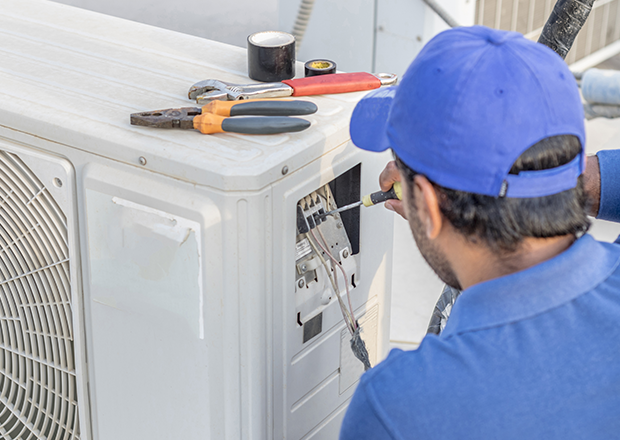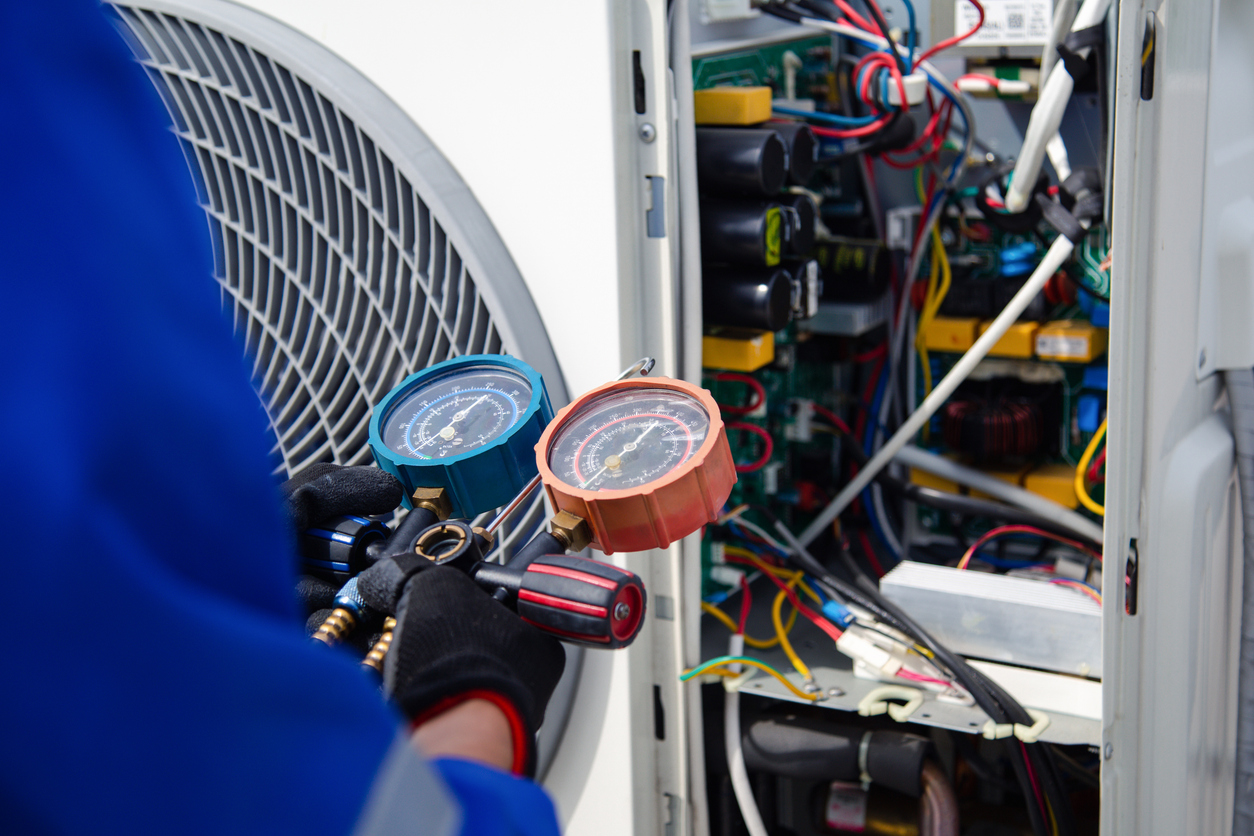Understanding A/c: Usual Problems of A/c Units and Their Solutions
HVAC systems play a crucial role in maintaining indoor comfort. However, cooling devices usually experience typical troubles that can prevent their efficiency. Problems like insufficient air conditioning, uncommon sounds, and regular biking can show much deeper mechanical problems. Furthermore, water leaks and unpleasant odors can jeopardize air top quality. Understanding these challenges and their services is vital for reliable upkeep. What steps can homeowners take to ensure their air conditioner devices run effectively?
Inadequate Cooling Performance
What creates poor air conditioning performance in an a/c system? A number of elements can add to this concern. A typical cause is a dirty air filter, which restricts air movement and lowers cooling efficiency. Additionally, reduced cooling agent degrees because of leaks can impede the system's ability to absorb heat effectively. Another potential issue may arise from a malfunctioning thermostat, leading to wrong temperature level readings and inappropriate cooling cycles. Obstructed or unclean condenser coils can likewise prevent warmth dissipation, further influencing performance. Ultimately, ductwork problems, such as leakages or obstructions, can cause uneven air conditioning throughout a room. Determining these problems without delay is vital for maintaining suitable a/c feature and guaranteeing a comfy indoor environment. Normal maintenance and evaluations can aid reduce these issues and improve the system's general performance.
Unusual Noises Originating From the Air Conditioner Device
A range of uncommon sounds originating from an air conditioner system can suggest underlying problems that call for focus. Common noises consist of rattling, which may recommend loosened elements or particles within the unit. Hissing sounds usually point to refrigerant leaks, compromising the system's effectiveness. A grinding noise might indicate damaged bearings or electric motor problems, while a piercing squeal might signal an issue with the compressor or a slipping belt.
Each of these noises acts as a warning sign that something may be wrong, possibly bring about more substantial damage if not resolved without delay. Property owners ought to avoid ignoring these acoustic signs and think about getting in touch with a certified cooling and heating professional for medical diagnosis and repair service. Timely intervention can not only restore capability yet additionally extend the lifespan of the system. AC repairman. Acknowledging these sounds as signs of trouble is crucial for preserving peak cooling efficiency
Constant Cycling On and Off
Constant biking on and off can indicate inadequacies or breakdowns within a heating and cooling system, frequently referred to as short-cycling. This problem can cause boosted energy intake and may cause unneeded wear on the unit's components. A number of factors can add to this problem, including an improperly sized cooling system, a malfunctioning thermostat, or unclean air filters. When an air conditioning system is as well big for the area, it cools as well quickly, creating it to cycle often without effectively evaporating the air. If the thermostat is faulty, it may inaccurately signal the device to switch on and off. Furthermore, blocked or dirty air filters can restrict airflow, motivating the system to function harder and cycle more frequently. Attending to these concerns promptly is important to over at this website improve performance, prolong the life expectancy of the cooling and heating system, and maintain optimal interior convenience.
Water Leakages and Water Drainage Issues
Water leakages and water drainage concerns can posture substantial challenges for heating and cooling systems, resulting in prospective damage and ineffectiveness. These issues commonly come from stopped up condensate drains, which avoid water from draining pipes appropriately and can lead to overflow. Additionally, harmed drain frying pans or inappropriate setup may intensify these leakages, creating water to build up in unwanted locations.
Routine maintenance is important to prevent such problems; guaranteeing that condensate lines are clear and drain frying pans are intact can alleviate the risk of leaks. Homeowners need to routinely look for signs of wetness around the device, as early discovery can prevent extra comprehensive damages. In cases where leaks are identified, instant activity is required, which may consist of getting rid of blockages or replacing damaged components. Dealing with water leakages and water drainage issues not only secures the HVAC system however additionally maintains indoor air top quality and convenience.
Bad Odors and Air Quality Worries
Bad smells emanating from cooling and heating systems can show serious air high quality problems. Common sources of these undesirable smells consist of mold, mildew, or microorganisms development in the ductwork, typically as a result of moisture buildup. If the system has an unpleasant, moldy smell, it might signify that the air filters are clogged or that there is insufficient ventilation, allowing contaminants to circulate. Additionally, a burning smell might recommend electric concerns or overheating elements, needing instant interest.
Home owners should regularly replace air filters and timetable regular maintenance to ensure peak air quality. Using an air cleanser can additionally assist get rid of odors and boost interior air high quality. If odors persist regardless of these actions, specialist inspection and cleansing might be needed to identify and deal with underlying issues. AC repairman. Awareness of these smells is important, as they can impact wellness and comfort in interior atmospheres

Frequently Asked Questions
How Typically Should I Arrange AC Maintenance?
It is recommended to arrange air conditioning maintenance a minimum of annually, preferably prior to the air conditioning season starts. Normal examinations can aid determine problems early, guaranteeing efficient operation and prolonging the lifespan of the device.

What Is the Ordinary Life Expectancy of an A/c System?
The ordinary life expectancy of an AC device usually ranges from 15 to twenty years. Elements such as upkeep, usage patterns, and ecological conditions can substantially influence this period, impacting overall effectiveness and efficiency in time.
How Do I Choose the Right Dimension A/c Unit for My Home?

What Are the Indications My Air Conditioning Unit Requirements Replacement?

Can I Mount an A/c System Myself?
While setting up an air conditioning unit oneself is possible, it requires technological understanding and appropriate devices. HVAC contractor. Numerous people may encounter challenges with installment, possibly causing ineffectiveness or security threats, making professional support a good idea for suitable results
Final thought
In recap, understanding usual a/c problems and their remedies is necessary for maintaining effective air conditioning device performance. Addressing concerns such as inadequate air conditioning, unusual sounds, frequent cycling, water leakages, and unpleasant smells can substantially boost indoor convenience and air top quality. Normal upkeep, including filter adjustments and prompt repair services, plays a significant function in protecting against these issues. By remaining aggressive, property owners can assure their HVAC systems operate properly, ultimately extending the life-span of their air conditioning systems.